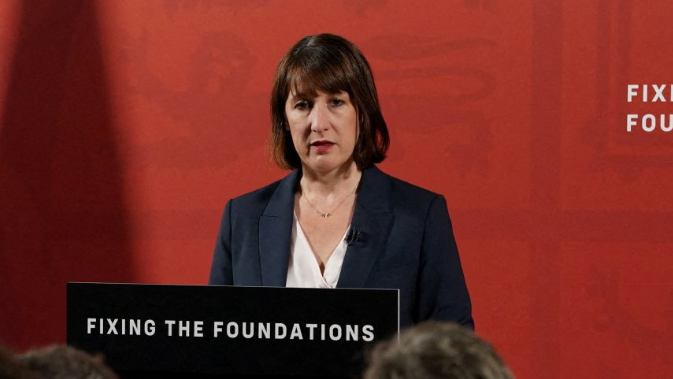Rachel Reeves urges Labour MPs to back winter fuel cut

The chancellor says blame for the decision to cut payments falls on the Conservatives - something they deny
- Published
Chancellor Rachel Reeves has urged Labour MPs to back her plan to cut winter fuel payments.
More than nine million pensioners will no longer be eligible for up to £300 this winter after Ms Reeves announced the introduction of means-testing following Labour's election win.
There are concerns dozens of Labour MPs could abstain in a vote on the policy in Parliament later, amid worry pensioners on modest incomes may miss out this winter.
In a call for solidarity ahead of that vote, Ms Reeves said the blame should fall on "reckless decisions" on public finances by the Conservatives.
Addressing MPs at a meeting of the Parliamentary Labour Party on Monday evening, the chancellor told them: "We stand, we lead and we govern together."
Ms Reeves added: "It is the right thing to do, to target money at a time when finances are so stretched, at people who need them most."
She said the government's commitment to the triple lock meant the state pension had risen by around £900 compared with a year ago.
Under the triple lock the state pension goes up each year by either 2.5%, inflation, or average earnings – whichever is the highest figure.
This means that from April, the full state pension is expected to rise by £460 a year, following the release of the latest official wages data.
Ms Reeves and Prime Minister Sir Keir Starmer insist the winter fuel payment cut - worth about £1.5bn - is necessary to fill an alleged £22bn "black hole" in the budget left by the previous Conservative government.
The Labour government has a large majority and will win the vote, which has been called by the Conservative opposition, but it will be another early test of the prime minister’s authority.
There is speculation about a potential rebellion by at least 17 Labour MPs who signed a Commons motion describing the plans to means test the benefit as "bureaucratic and unpopular".
One prominent rebel, Diane Abbott, told the BBC's The World Tonight programme she "certainly won't support" her party in Tuesday's vote.
She said: "It's ill-thought-out... they're doing it to look tough and I think it's wrong to play games at the expense of the poorest pensioners just to look tough."
Ms Abbott has signed the Commons motion and suggested "maybe hundreds" of MPs were upset about the planned cuts and could act on that.
The Labour mayor of Greater Manchester, Andy Burnham, urged the government to consider a higher threshold for pensioners "who are right at that cliff-edge".
However, Downing Street has insisted the government is standing firm and there are no plans to give further mitigations to pensioners who lose out.
The Conservatives say Labour is exaggerating the state of the public finances to lay the ground for tax rises in the October budget.
Conservative leader Rishi Sunak accused ministers of trying to "fast-track cuts" to vital support for pensioners "to fund an inflation-busting pay rise for train drivers".
How much is the winter fuel payment and how can I still claim it?
- Published16 September
Starmer faces union pressure ahead of winter fuel payment vote
- Published9 September 2024
Is there a £22bn ‘black hole’ in the UK’s public finances?
- Published31 October 2024
The winter fuel payment was a universal benefit, meaning it was paid to all pensioners, regardless of their income or wealth.
The think tank, the Social Market Foundation, argues universal winter fuel payments meant some well-off pensioners were receiving hundreds of pounds they did not need to cover energy costs and would be better targeted elsewhere.
However, charities such as Age Concern said they believed two million pensioners would struggle to pay their bills and heat their homes as a result of the change.
The government estimates 9.3 million fewer pensioners will be able to claim the payment of between £200 and £300 a year.
Only those on low incomes who receive certain benefits will be eligible and the vast majority of those will only receive the winter fuel payment if they have first claimed pension credit, a state pension top-up.
The government is urging people to check whether they are eligible to claim pension credit to increase take-up.
Downing Street said there had been 38,500 pension credit claims in the last five weeks.
In comparison, there had been 17,900 claims over the five weeks before Ms Reeves announced the winter fuel payment would only be available to those on certain benefits in July.
Dave Stone, from Bournemouth, has been facing a delay with applying for pension credit since 6 February, months before planned cuts to the winter fuel payment were announced, and says the Department for Work and Pensions (DWP) is now "even busier because of the latest changes".
He applied online to claim pension credit for his aunt, following the council telling him she was eligible, and was given a six-week deadline of 19 March for a response.
He said he still does not have an answer seven months later, despite nearly 20 interactions with the team.
"Every time I gave them an extra week or two, then I would call them back after they'd missed their deadlines, and nothing much would happen," Mr Stone told BBC Radio 4's PM programme.
"They've got to the stage where they're now even busier, because of the latest changes they can't put anybody through to the pensions centre any more - all they can say is 'we'll call you back' and of course I know [that] isn't going to happen."
A DWP spokesman said it had "surged additional staff" to cover the increase in pension credit calls.